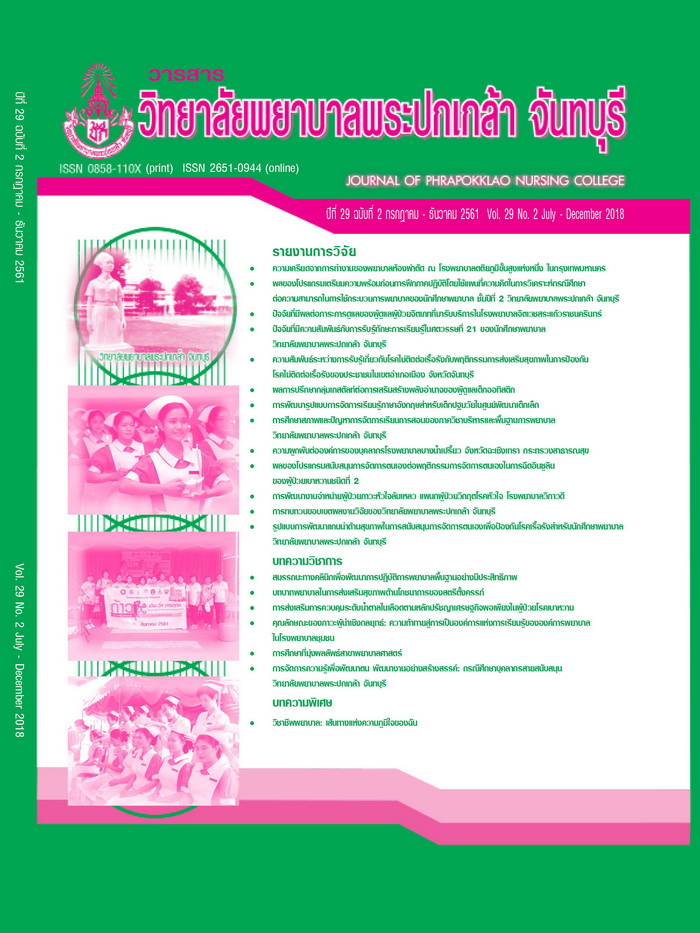Job-related Stress among Perioperative Nurses in a Super-tertiary Hospital in Bangkok
Keywords:
Job-related stress, Job characteristics, Organizational climate, Stress management, Perioperative nurseAbstract
This cross-sectional research aimed to examine the associations between the selected factors (individual characteristics, job characteristics, organizational climate, and stress management) and job-related stress and to examine its predictive factors among perioperative nurses. The samples consisted of 226 perioperative nurses. The research instrument was a 5-part questionnaire:- individual characteristics, job characteristics with the reliability of .86, organizational climate with the reliability of .92, stress management with the reliability of .74, and job-related stress with the reliability of .93. Data were collected from August to September, 2015. Statistics used for data analysis included frequency, percentage, mean, standard deviation, simple linear regression, and stepwise multiple regression.
The research results revealed that 1) an overall job characteristics was at a good level (60.70%); an overall organizational climate, stress management, and job-related stress were at the moderate level (57.70%, 76.10%, and 57.70%, respectively); 2) income, receipt of training about coping with stress, job characteristics, organizational climate, and stress management were found to be negatively correlated with the job-related stress among perioperative nurses with statistical significance; and 3) two factors were found to be capable of 16.80% predicting job-related stress among perioperative nurses:- organization policy and management and task identity (adj. R2 = .168, p < .001).
This research suggests that the perioperative nurses should be offered opportunities to participate in the setting of policy and standards with impact on practice, including the holding of meetings for exchanges of opinions and learning to update operative procedures and devices to be identity of their works for the benefit of building motivation and retaining them in the organization.
References
ทิวา กลั่นเรืองแสง. (2552). ปัจจัยที่มีผลต่อความเครียดในการปฏิบัติงานของพยาบาลห้องผ่าตัดโรงพยาบาลตำรวจ. สารวิทยาลัยพยาบาลกองทัพเรือ, 8(1), 12-23.
ปาณิภา เสียงเพราะ. (2557). ปัจจัยที่มีความสัมพันธ์กับความเครียดจากการทำงานของพยาบาลในโรงพยาบาลเฉพาะทางโรคมะเร็ง เขตภาคกลาง. วารสารวิจัยทางวิทยาศาสตร์สุขภาพ, 8(1), 17-27.
พลภัทร เจริญเวียงเวชกิจ. (2551). ความสัมพันธ์ระหว่างคุณลักษณะงาน บรรยากาศองค์การ และความเชื่ออำนาจควบคุม กับความเครียดในการทำงานของพนักงานบริษัทเอกชน (การค้นคว้าแบบอิสระปริญญามหาบัณฑิต). มหาวิทยาลัยเชียงใหม่.
มรรยาท รุจิวิชชญ์. (2556). การจัดการความเครียดเพื่อสร้างเสริมสุขภาพจิต (พิมพ์ครั้งที่ 2). กรุงเทพฯ: สำนักพิมพ์มหาวิทยาลัยธรรมศาสตร์.
เรณู อาจสาลี. (2550). การพยาบาลผู้ที่มารับการผ่าตัด (Perioperative nursing). กรุงเทพฯ: เอ็น ที เพรส.
สมส่วน พงศ์เจริญ. (2544). ความสัมพันธ์ระหว่างอัตมโนทัศน์ ประสบการณ์การทำงาน และบรรยากาศองค์การ กับความเครียดของพยาบาลวิชาชีพในโรงพยาบาลชุมชน (วิทยานิพนธ์ปริญญามหาบัณฑิต). ชลบุรี: มหาวิทยาลัยบูรพา.
สุวรรณี ลิ่มศิลา. (2547). ปัจจัยที่เกี่ยวข้องกับการเผชิญความเครียดของพยาบาลห้องผ่าตัด โรงพยาบาลรามาธิบดี (วิทยานิพนธ์ปริญญามหาบัณฑิต). นครนายก: มหาวิทยาลัยศรีนครินทรวิโรฒ.
อังศินันท์ อินทรกำแหง. (2551). การสังเคราะห์งานวิจัยที่เกี่ยวกับความเครียดและการเผชิญความเครียดของคนไทย. กรุงเทพฯ: สถาบันวิจัยพฤติกรรมศาสตร์ มหาวิทยาลัยศรีนครินทรวิโรฒ.
อารยา สัมพันธพงษ์. (2557). ปัจจัยที่มีความสัมพันธ์ต่อความเครียดของเจ้าหน้าที่พยาบาลแผนกอายุรกรรม โรงพยาบาลมหาวิทยาลัยในสังกัดของรัฐแห่งหนึ่ง (วิทยานิพนธ์ปริญญามหาบัณฑิต). กรุงเทพฯ: มหาวิทยาลัยมหิดล.
เอื้ออารี เพ็ชรสุวรรณ. (2555). คุณภาพชีวิตการทำงานของพยาบาลโรงพยาบาลเอกชนแห่งหนึ่ง. วารสารเกื้อการุณย์, 19(2), 103-117.
Azizpour, Y., Shohani, M., Sayehmiri, K., & Kikhavani, S. (2013). A survey on the associated factors of stress among operating room personnel. Thrita Journal of Medical Sciences, 2(3), 19-23.
Bailey, J. T., Steffen, S. M., & Grout, J. W. (1980). The stress audit: Identifying the stressors of ICU nursing. Journal of Nursing Education, 19(6), 15-25.
Hackman, J. R., & Oldham, G. R. (1980). Work redesign. Reading, MA: Addison-Wesley.
Jalowiec, A., Murphy, S. P., & Powers, M. J. (1984). Psychometric assessment of the Jalowiec Coping Scale. Nursing Research, 33(3), 157-161.
Steers, R. M. (1977). Organizational effectiveness: A behavior view. Santa Monica, CA: Goodyear.
Downloads
Published
How to Cite
Issue
Section
License
Copyright (c) 2018 JOURNAL OF PHRAPOKKLAO NURSING COLLEGE

This work is licensed under a Creative Commons Attribution-NonCommercial-NoDerivatives 4.0 International License.
เนื้อความ ข้อมูล และรายการอ้างอิงที่ผู้เขียนใช้ในการเขียนบทความเพื่อลงตีพิมพ์ในวารสารวิทยาลัยพยาบาลพระปกเกล้า จันทบุรี ถือเป็นความคิดเห็นและความรับผิดชอบของผู้เขียน คณะผู้จัดทำวารสารไม่จำเป็นต้องเห็นพ้องด้วยหรือร่วมรับผิดชอบ
บทความที่ได้รับการลงตีพิมพ์ในวารสารวิทยาลัยพยาบาลพระปกเกล้า จันทบุรี ถือเป็นลิขสิทธิ์ของวารสารวิทยาลัยพยาบาลพระปกเกล้า จันทบุรี หากหน่วยงานหรือบุคคลใดต้องการนำส่วนหนึ่งหรือทั้งหมดของบทความไปเผยแพร่ต่อเพื่อวัตถุประสงค์ใด ๆ จะต้องได้รับอนุญาตจากบรรณาธิการวารสารก่อน



